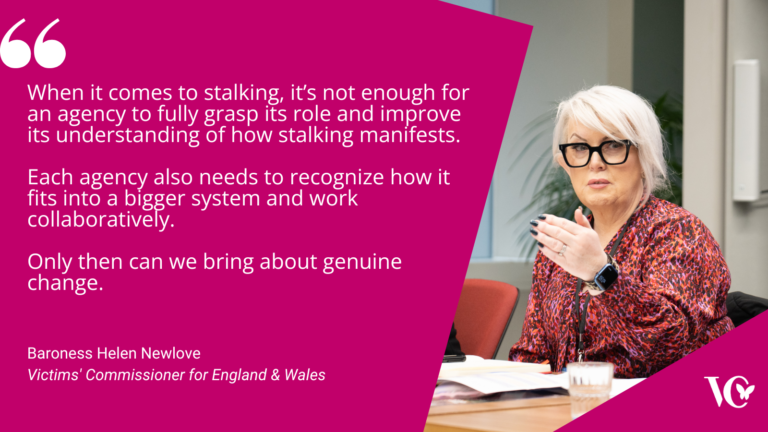BLOG: National Stalking Awareness Week: Delivering a victim-centred, collaborative approach to tackling stalking

To mark National Stalking Awareness Week, Victims' Commissioner Baroness Newlove highlights the importance of centring the victim and working collaboratively when tackling stalking.
This past week we marked National Stalking Awareness Week, an important annual initiative by the Suzy Lamplugh Trust, a leading stalking charity.
During the week — which included a flagship conference — agencies and partners came together to raise awareness of stalking as a crime, elevate victim voices and champion those advocating on behalf of stalking survivors.
While this week saw the encouraging announcement of new government guidance to promote stalking protection orders, we also got a sense of the challenge we’re facing.
Data published by the Suzy Lamplugh Trust reveals persistent problems across agencies handling stalking cases, alongside significant gaps in national victim data. This serves as a stark reminder that despite progress, significant work remains in effectively tackling stalking.
Stalking is a serious crime that blights lives. In the year ending March 2023, 1 in 5 women reported having been a victim of stalking at least once since the age of 16, according to the Crime Survey for England and Wales. That bears repeating: 1 in 5 women.
So, it’s so important to remind these women – and men – that they are not alone. I was pleased to speak at Suzy Lamplugh Trust’s conference earlier this week and do just that.
I spoke about the need for a victim-centred, collaborative approach to tackling stalking.
Stalking victims need all agencies to work together to ensure they have support from the first point of disclosure right through to conviction and beyond. To effectively tackle stalking, we need to listen to victims, see the bigger picture and join the dots.
Yet too often incidents are still viewed in isolation and underestimated — even mistaken for non-criminal behaviour. My recent work has provided me with several examples illustrating just this. Some of which, I want to highlight and set out below.
In my annual victim survey, due to be published soon, one stalking survivor explained how, when going to the police for help, the incident was minimised and almost downplayed. This was despite other reports relating to the same perpetrator and patterns of wider criminal behaviour. Whilst just one account, it illustrates how stalking often remains poorly understood by police.
A similarly unhelpful mentality persists online, beyond the agencies normally associated with our criminal justice system.
In 2022, my predecessor Dame Vera Baird KC, conducted research into so-called online harms to inform the government’s Online Safety Act. The report found that 40% of those surveyed had experienced a combination of offline and online offending. In other words, it found that the barriers between offline and online offending were becoming increasingly blurred.
The Act came into force in October 2023 and contains a range of measures intended to improve online safety. The communications regulator Ofcom was tasked with putting many of those laws into practice.
In my recent response to Ofcom’s consultation, I argued that their current guidance for protecting users from online stalking will be ineffective for victims unless significantly revised.
By failing to consider the overlap between online and offline abuse, the guidance overlooks the reality that perpetrators often harass victims in both spheres. To capture this wider pattern — including the full damage a stalker inflicts upon their victim — the guidance needs to reflect this.
The Ofcom consultation illustrates that we still have a way to go when it comes to tackling stalking.
As do the frustrations shared with me by stalking survivors.
Yet on a brighter note, my recent victim advocate report, Going Above and Beyond, showcases the positive impact of independent stalking advocates. Through compelling examples, it details how they empower survivors and foster a victim-centred, collaborative approach to tackling stalking. I urge you to read it.
One victim said:
The police only took the case seriously and classed it as stalking when my advocate came on board. I don’t think it would have gone to the CPS without her, even though I was fighting for this with the police before I self-referred.
In other parts, the report shows how victim advocates serve as focal points for information-sharing, taking it upon themselves to liaise with relevant agencies and authorities.
As catalysts for more collaborative working, the support these advocates provide is invaluable — and never more so at a time when victims are facing long waits for justice amid record-high court backlogs.
So, what is my takeaway from National Stalking Awareness Week?
As we carry on pushing for meaningful change, we need to continue seeing the bigger picture, listen to victims and join the dots.
We know it can be done. Victim advocates have a vital role to play in this. But they alone cannot and should not carry this burden.
When it comes to stalking, it’s not enough for an agency to fully grasp its role and improve its understanding of how stalking manifests. Each agency also needs to recognize how it fits into a bigger system and work collaboratively.
Only then can we bring about genuine change.
- If you need help, support is available. Click here for more information or contact the National Stalking Helpline on 0808 802 0300.
